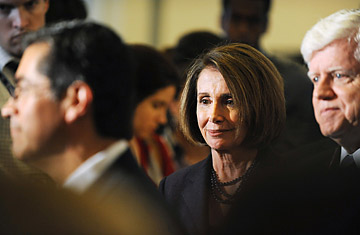
Speaker Nancy Pelosi stands with fellow Democratic leaders, including Representative John Larson, right, at a news conference following a caucus meeting on Capitol Hill on Nov. 17, 2010
Late on Thursday, Dec. 16, the House voted on legislation extending for two years George W. Bush's tax cuts. The House gave final approval to the measure by a margin of 277-148, with each party contributing an almost identical number of votes in favor (the Democrats, 139 and the Republicans, 138). In what was a rare reach across party lines, President Obama negotiated the $858 billion package with Senate Republicans. Speaker Nancy Pelosi found out about the deal on the evening of Dec. 6, when Representative Chris Van Hollen pulled Pelosi aside at the White House's annual congressional holiday ball and told her that the President was at that minute making the announcement on TV from the Eisenhower Building next door. Her caucus was particularly outraged that the President caved to GOP demands to raise the estate-tax threshold from $1 million (taxed at 55%) to $5 million (taxed at 35%) — a giveaway to the rich, they called it, at a time when the country can ill afford it.
Pelosi was nothing but charming when the President arrived late to the party. But at a leadership meeting the next day, she made it clear that she had no intention of selling the President's plan to her outraged caucus — at least not yet. The other leaders followed suit, and there was no one to defend the compromise when Pelosi's rank and file that evening railed about how "screwed" they felt. At another meeting, on Dec. 8, the White House had to send Vice President Joe Biden to explain Obama's decision.
In the following days, Pelosi neither defended nor criticized the measure, except to say that the estate-tax provision was, perhaps, "a bridge too far." Then polls began to show public support for the plan — an NBC/WSJ poll early this week found that 54% of Democrats and 57% of liberals want to see it pass — and members of Congress went home and heard less than outrage from their constituents. Sensing that the tide was turning, Pelosi finally addressed the issue at a caucus meeting on the night of Dec. 14. In a 10-minute speech, she outlined all the important items that needed to pass in the bill: middle-class tax relief, unemployment insurance for millions of Americans, renewable-energy tax credits. She also assured leery members that they would have the chance to vote against the estate-tax provision before final passage — most likely in the form of a substitute bill they passed a year ago that would tax estates worth $3.5 million or more at a maximum rate of 45%. The legislation, she told the caucus, was a win for Democrats because it helped them show that Republicans care only for the rich at the expense of the middle class. Most members left, if not convinced, somewhat mollified. "The appetite for rejecting the White House deal isn't where it should be," said Raul Grijalva, co-chair of the House Progressive Caucus, speaking to reporters. "It will probably pass."
And so Pelosi's run as Speaker ends this week on a somewhat challenging, unexpected and perhaps disappointing note. In her four years as Speaker — the first two during George W. Bush's presidency — Pelosi helped engineer an increase in the minimum wage and federal funding for stem-cell research. She worked on expanding and making more affordable student loans, getting rid of some tax breaks for Big Oil and shoring up U.S. pensions. She unwillingly passed the $700 billion TARP bill after GOP support for Bush collapsed. She shepherded through the stimulus, health care reform, climate change legislation, financial reregulation and now the once reviled Bush tax-cut extensions. "Unlike other Speakers, in my time here, she became a very active participant in legislation: getting the legislation passed, rounding up the support, getting a diverse caucus united," says Henry Waxman, chairman of the House Energy and Commerce Committee.
Pelosi will become the minority leader, in part, she said in her announcement on Nov. 5, to protect all that she's accomplished. "Our work is far from finished," she said. "We have no intention of allowing our greatest achievements to be rolled back."
Some, though, worry that she has not learned the lesson that cost Democrats 63 seats and the majority in the midterm elections: Pelosi's great legacy was also the caucus's greatest weakness at the polls. The biggest problem was that "we overreached," says Representative Jason Altmire, a Pennsylvania Democrat. "This was a monumental defeat. And until we realize as a party that the reason we lost those seats is that the voters were unhappy with the legislation that was passed here, we're not going to be able to move forward to correct it."
In the next Congress, Pelosi will preside over a shrunken, even-more-liberal caucus, as many feel they lost seats because they weren't aggressive enough in dragging the President to the left on things like a strong public option on health care reform, labor issues and the environment. With the tax deal, though, Obama seems to be moving more to the center. Which may mean that Pelosi is in for more awkward weeks like this one.
